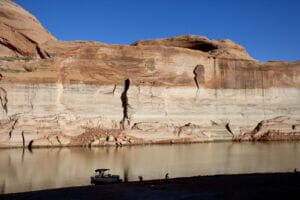The Sun Link Tucson Streetcar earned the coveted President’s Award (Best of Show) in Arizona Forward’s 35th Annual Environmental Excellence Awards, held in partnership with SRP. The project is the first Made in America streetcar in nearly 60 years.
Arizona Forward celebrated its 35th milestone anniversary of this historic program, in addition to the competition’s statewide expansion. For the first time ever, all categories were open to submittals from anywhere throughout the Grand Canyon State.
“We’re breaking new ground by broadening the scope of our largest, most prominent event, which has become known as the Academy Awards of the environmental community,” Diane Brossart, president and CEO of Arizona Forward announced to nearly 600 business and civic leaders at the Sat., Sept. 12 gala. “It’s inspiring to see all the good work contributing to the environmental sustainability and economic vitality of Arizona cities and towns.”
More than 120 entries were received in Arizona’s oldest and most prestigious awards competition focusing exclusively on sustainability. Submittals from 30 communities within the Grand Canyon State were represented, 18 of which were outside of Maricopa
County. The ceremony was held at an exclusive new venue, Chateau Luxe, and attended by a prominent audience of influencers representing state, county and municipal organizations, as well as the corporate sector.
Arizona Forward and SRP presented 17 first-place Crescordia awards and 31 Awards of Merit. Projects were recognized in a range of streamlined categories, including two brand new ones – the Governor’s Award for Arizona’s Future and Healthy Communities. Other categories include: Buildings & Structures, Energy & Technology Innovation, Site Development, Art in Public Places, Environmental Education/Communication and the SRP Award for Environmental Stewardship.
Jurists selected the Sun Link Tucson Streetcar for top honors because the iconic project is vital to improving the look and feel of downtown Tucson while providing a much-needed boost to the community’s infrastructure. The $196 million endeavor is the largest and most complex construction project the city of Tucson has ever undertaken. The project also earned a first-place Crescordia in the Healthy Communities Multimodal Transportation & Connectivity category. Crescordia is a Greek term meaning, “to grow in harmony,” and the President’s Award is selected from among all Crescordia recipients.
Running through the city’s largest activity centers, the Sun Link Streetcar connects more than 100,000 people who live and work in the vicinity. It provides affordable, clean and comfortable travel, connecting five of Tucson’s most unique districts along a 4-mile line with 23 stops along the way.
The construction of the streetcar generated more than 500 jobs and triggered six new housing projects along the corridor. Boasting about 4,000 riders per day, this innovative project is fostering and connecting a healthy, vibrant community in southern Arizona.
Five southern Arizona projects earned first-place Crescordia awards, including the notable Mariposa Land Port of Entry in Nogales. Northern Arizona yielded three Crescordia awards: the Museum of Northern Arizona Easton Collection, The Arizona National Scenic Trail, and Northern Arizona University’s multi-panel solar thermal hot air system. Central Arizona earned nine Crescordia awards.
Steve Seleznow, president & CEO of the Arizona Community Foundation, served as lead judge for the competition. Other jurists include: William Auberle, senior consulting engineer of Pinyon Environmental Inc.; Klindt Breckenridge, president of Breckenridge Group Architects/
Planners; Robert Breunig, president emeritus for the Museum of Northern Arizona; Joseph Loverich, senior project manager for JE Fuller Hydrology and Geomorphology; Christopher McIsaac, policy advisor for energy and environment for the Office of the Arizona Governor; Suzanne Pfister, president & CEO of St. Luke’s Health Initiatives; Lori Singleton, director emerging customer programs – solar, sustainability and telecom at SRP; Stephanie Rowe, AIA, LEED AP, principal of Reece Angell Rowe Architects; Richard Underwood, owner & president at AAA Landscape; and Cree Zischke, director of philanthropy at the Arizona-Sonora Desert Museum.
Since its inception in 1969 as Valley Forward, Arizona Forward has brought business and civic leaders together to convene thoughtful public dialogue on regional issues and to improve the sustainability of communities throughout the state. The organization operates with the belief that businesses must take a leadership role in solving the complex and sometimes controversial problems that confront growing population centers.
In addition to Sun Link Tucson Streetcar, Crescordia winners include:
TEAM ARIZONA COLORADO RIVER SHORTAGE AND DROUGHT PREPAREDNESS (City of Phoenix/Central Arizona Water Conservation District/ADWR Partnership) — Governor’s Award for Arizona’s Future
In response to dwindling supplies, Arizonans are forming strategic alliances and innovative water management strategies toward ensuring an adequate, safe and sustainable supply. Water providers and planners have stored nearly 3.4 million acre-feet of Colorado River water underground; partnered to store Central Arizona Project water in Tucson aquifers; aligned with irrigation districts in central Arizona and other partners to conserve and store water in Lake Mead; provided $5 million to help fund the pilot Colorado River System Conservation Program; and established the Northern Arizona Forest Fund to protect the state’s watersheds. These collaborative efforts have significantly increased the resiliency of Arizona’s water supplies.
TUCSON UNIFIED SCHOOL DISTRICT PIONEERING 11 MW SOLAR PROJECT (Natural Power and Energy)—Governor’s Award for Energy & Technology Innovation, Southern Arizona
At more than 11 megawatts, Tucson Unified School District’s groundbreaking solar generation project encompasses 42 schools and is the largest distributed school solar project in the nation without utility incentives. It represents TUSD’s commitment to renewable energy, reducing its carbon footprint, saving money and serving as a model of environmental stewardship to students and other school districts. The project will ultimately supply about 80 percent of the electricity needed at each site, save an estimated $170,000 in energy costs in its first year and more than $11 million over the 20-year term. Systems are now operational at 15 schools.
MARIPOSA LAND PORT OF ENTRY (Jones Studio) — Buildings & Structures (Civic)
One of the busiest land ports in the U.S., the Mariposa Land Port of Entry in Nogales, Arizona, processes more than 2.8 million northbound vehicles each year. Built in the 1970s, the port demanded modernization and expansion due to growth in international trade and traffic volume. Completed in August 2014, the LEED Gold certified 55-acre site contains 270,000 gross square feet of buildings, inspection facilities and kennels for both southbound and northbound traffic. The central spine of the port is the oasis, a desert garden that runs the length of the main buildings.
THE UNIVERSITY OF ARIZONA OLD MAIN RESTORATION (The University of Arizona) — Buildings & Structures (Historic Preservation)
Opening in 1891, Old Main was the first building on the University of Arizona campus. The approach to preserving this historical structure included bringing the exterior appearance and features back to their original grandeur while placing the functionality of a 21st-century university into a 19th-century shell. Old Main is the oldest LEED certified building in Arizona and a model for sustainable historical preservation. The existing building envelope was largely unaltered, yet new mechanical systems reduced energy use by 24 percent. Deteriorated masonry was restored instead of replaced. Subterranean water infiltration was addressed through concealed drainage systems that preserved the existing habitat comprising the Old Main “teardrop” site.
MUSEUM OF NORTHERN ARIZONA EASTON COLLECTION CENTER (Kinney Construction Services Inc.)— Buildings and Structures (Commercial & Institutional)
The Easton Collection Center is a 17,282-square-foot LEED Platinum certified facility. It provides an optimal environment for long-term storage of priceless museum collections and sets a high standard for environmental sustainability while reflecting the character of the region and its cultures. Features include a 14,000-square-foot living roof, a 22,000-gallon rain/snow water harvesting cistern, drought-tolerant native plants and bioswales to utilize surface runoff. The facility was designed around existing ponderosa pines, none of which were removed. Following recommendations from an American Indian Advisory Committee, the building has a number of symbolic and functional elements designed to make the Native community feel at home in the structure.
REGIONAL OPTIMIZATION MASTER PLAN (Pima County Regional Wastewater
Reclamation Department) — Buildings and Structures (Industrial & Public Works)
The Regional Optimization Master Plan is among the largest construction projects in southern Arizona. It significantly upgraded and modernized the metropolitan portion of the Pima County Regional Wastewater System, resulting in water clarity and quality improvements; reduction of nutrient pollution; declining effluent flow extent due to higher infiltration rates; and aquatic wildlife quantity and diversity showing signs of improvement. The entire program was completed in 2014 at a cost of $605 million. Design and construction followed two intensive years of planning and coordination with the Arizona Department of Environmental Quality, national engineering firms and local stakeholders.
DOWNTOWN TOLLESON REDEVELOPMENT PROJECT: PASEO DE LUCES (J2 Engineering and
Environmental Design) — Healthy Communities (Sustainable Communities)
The Downtown Tolleson Redevelopment Project was a 1-mile urban revitalization effort that set out to create a true sense of place for the city of Tolleson. It reflects the city’s history, culture and spirit while integrating sustainable design principles. The pedestrian-friendly destination environment serves as an economic driver for the community and provides a foundation for fostering private investment. Wide pedestrian sidewalk zones encourage restaurants to utilize on-street dining. Many of the themed custom-designed elements, including the award-winning art sculpture program, dynamic paving system, signage and custom tiled seat walls, reflect the cultural story of Tolleson and its proud heritage.
LOW IMPACT DEVELOPMENT TOOLKIT (City of Mesa) — Healthy Communities (Public Policy/Plans)
Like most communities spanning Arizona, the cities of Mesa and Glendale historically considered stormwater to be a nuisance that needed to be quickly eliminated through an expensive pipe and channel system. By developing and advancing Low Impact Development, these communities are shifting the stormwater paradigm and recognizing stormwater as a resource that can be used to promote healthy urban communities. LID is a stormwater management method that engages native materials and simple tools to reduce runoff and pollution. The toolkit provides a user-friendly menu of LID methods, best practices, technical requirements and construction details that help communities restore washes and enhance streetscapes or parks while cooling down cities at night.
HONEYWELL ARIZONA AEROSPACE – BEING THE DIFFERENCE! (Honeywell)— Healthy Communities (Sustainable Workplaces)
Employees at seven Honeywell Aerospace sites in Arizona are empowered and encouraged to carry out improvement ideas targeted at reducing the corporation’s environmental footprint.
Since 2007, projects have matured from implementing “Turn It Off” campaigns and installing occupancy sensors on lighting to larger and more impactful efforts, such as completing a Building Envelope Solutions initiative. The focus has also expanded to include water conservation and waste diversion. Since the program’s inception, 595 energy projects targeting energy and water conservation have been executed, resulting in energy savings of 202 billion British thermal units and water savings of 24.8 million gallons. In addition, more than 3.6 million pounds of waste has been diverted from local landfills in the last 18 months alone.
SOLAR THERMAL HOT AIR TECHNOLOGY (Northern Arizona University) — Energy and Technology Innovation
Northern Arizona University this year installed the first known multi-panel solar thermal hot air system in the country, demonstrating a long-standing commitment to decreasing its fossil fuel consumption. While renewable energy alternatives like solar and wind can reduce net electricity use, options for directly reducing fossil-based heating are more limited. Yet heat and hot water comprise nearly half the country’s energy demand so the opportunity for cost-effective solar thermal technology is massive. Technology utilized by NAU and developed by
Phoenix-based SolarThermiX is expected to pay for itself in a fraction of the time of campus solar and wind ventures. It holds promise for more than 650 major educational institutions that have signed the American College and University President’s Climate Commitment pledging to reduce long-term carbon emissions.
ARIZONA STATE UNIVERSITY COLLEGE AVENUE (SmithGroupJJR) — Site Development (Public Sector)
Conceived through a unique public-private partnership between ASU and the City of Tempe, the project transforms the existing multiuse transportation corridor into vital public realm space with a focus on walkability that encourages infill development and adaptive reuse of vacant land and buildings. Incorporating strategies from the National Complete Street Coalition, the project eliminates unused vehicular pavement by narrowing travel lanes to create dedicated bike lanes and shaded pedestrian walkways. A flexible urban plaza serves as a venue for events of all sizes. A unified, integral concrete paving design for the street, sidewalks and plaza spaces creates an extension of indoor and outdoor areas associated with nearby retail, including ASU’s College Avenue Commons. The use of bollards, lighting and street trees delineate traffic, creating separation for bicyclists and users while allowing for flexibility in event staging. The “new” people-focused College Avenue has transformed this district into a vital active space, providing a gateway to the city of Tempe and ASU that will serve generations to come.
VALLEY PARTNERSHIP COMMUNITY PROJECT (Arizona Foundation for the Handicapped) — Site Development (Private Sector)
Valley Partnership’s innovative annual Community Service Project this year benefited not only the Arizona Foundation for the Handicapped, a disability service provider, but also the community at large. This collaborative effort involved more than 92 different companies from throughout the Valley joining together to design/build a work site project using donated resources. Grounds of the facility, used daily by people with disabilities, were transformed into a therapeutic garden featuring desert plants and accessible space that serves the entire neighborhood. Landscaping enhances the area’s environmental quality and conserves natural resources, with catchment areas to harvest water for native plant irrigation. Raised gardens allow people with disabilities to grow herbs and vegetables for meals prepared daily. Adapted gaming areas and eco-friendly park furnishings promote health and well-being.
THE ARIZONA TRAIL ASSOCIATION’S GIFT TO ARIZONA (Arizona Trail Association)— Site Development (Parks and Trails)
The Arizona National Scenic Trail is one of the most innovative and unique approaches to fostering long term environmental sustainability throughout the state. This extraordinary project spotlights Arizona’s amazing biodiversity and healthy ecosystems, encouraging stewardship of our natural assets. The vison was conceived 30 years ago by Dale Shewalter, a Flagstaff sixth-grade teacher who sought a way to instill a spirit of conservation in Arizonans through experiential environmental education. It became the mission of the Arizona Trail Association, a nonprofit organization founded in 1994. Thousands of people were inspired by the concept and toiled tirelessly to establish an 800-mile sustainable pathway from Mexico to Utah. Today, the Arizona Trail links deserts, mountains, canyons, forests, communities and people in a pathway that is protected in perpetuity by an act of Congress.
PHOENIX SKY HARBOR AIRPORT TERMINAL 3, SKY TRAIN STATION PLATFORM AND BRIDGE (City of Phoenix Office of Arts and Culture) — Art in Public Places
Arizona artist Janelle Stanley merged her experience as a Diné (Navajo) weaver with contemporary design to create the terrazzo floors at Phoenix Sky Harbor International Airport’s Sky Train Bridge and Platform at Terminal 3. She relied on Diné weaving and basketry patterns to design the flowing shapes and intricate details in the floors’ winding paths of color, pattern and surprising textures. On the transfer bridge, the turquoise blue and black overlays represent the twisting and spinning that strengthens and elongates wool into yarn. The design of the station platform was inspired by details from Haak’u (Acoma) pottery and a piece of treasured family jewelry. Both designs convey the artist’s interest in expanding her cultural heritage to create vibrant new public spaces. The floors were fabricated by Corradini Corporation, using about 100,000 pounds of crushed aggregate, 20,000 linear feet of divider strip and 9,000 custom waterjet-cut pieces. This spectacular project will enhance the traveling experience for visitors and residents alike for years to come.
CITY OF PEORIA SUSTAINABLE U (City of Peoria) — Environmental Education/Communication
(Public and Private Sectors)
The City of Peoria’s Sustainable U program is open to all Arizona residents to educate, demonstrate and empower citizens to make responsible choices and lifestyle changes to reduce their environmental impact. By 2030, it is estimated that almost 5 billion of the world’s population will live in cities. The City of Peoria has a long history of educating its residents about water conservation, stormwater pollution and waste management. Recognizing the importance of education in changing behaviors, the city of Peoria created this new initiative to empower people to make a difference. Sustainable U offers a diverse list of workshops that utilize in-house experts, community partners and the Valley Permaculture Alliance. These engaging, interactive and fun workshops focus on topics such as: desert landscaping, edible landscapes, energy efficiency, composting, recycling, renewable energy, culinary classes, rainwater harvesting, and composting.
BACHELOR OF ARCHITECTURE SUSTAINABILITY PEDAGOGY (University of Arizona
School of Architecture) — Environmental Education/Communication (Educators, Students and Nonprofit Organizations)
The University of Arizona School of Architecture has long held a reputation for teaching that fosters a respect and reverence for the environment. As topics of climate change and sustainability become increasingly urgent, UA felt it was necessary to develop ways to improve its curriculum to address the needs of the future. In surveying what peer universities were doing, UA discovered that single classes or lectures were becoming commonplace. Upon further research and discussion, its Sustainability Pedagogy Task Force proposed using the entire five-year Design Studio sequence, which is the backbone of the curriculum, as the armature for investigating and teaching the principals of sustainable design. Over the course of the five-year sequence, each area of focus is highlighted at least once, so it becomes evident to students how the entirety of the sustainability issue might be seen holistically.
ARIZONA STATE UNIVERSITY FACILITIES MANAGEMENT GROUNDS/RECYCLING (Arizona State University) — SRP Award for Environmental Stewardship
Sustainability is core to all facets of operations at Arizona State University’s Facilities Management Grounds Services/Arboretum/Recycling departments on the Tempe campus.
The grounds team began analyzing operations about 10 years ago, making some easy changes such as leaving grass clippings on the turf and eliminating unneeded desk phones. Then they started sending all green landscape waste to Singh Farms to be converted to compost. The finished product was returned to campus for use in an organic fertilizer program, along with coffee grounds collected from university cafes. ASU’s recycling program now encompasses all
campuses and includes commingled blue bins, organics, a student “Ditch the Dumpster” initiative, construction debris recycling and special collection streams, all around a zero waste goal. This highly sustainable university also installed some of the Valley’s first solar-operated landfill and recycling compactors.
2015 ENVIRONMENTAL EXCELLENCE AWARDS
COMPLETE LIST OF WINNERS
GOVERNOR’S AWARD ARIZONA’S FUTURE
CRESCORDIA
Name of Entry: Team Arizona Colorado River Shortage and Drought Preparedness
Submitted by: City of Phoenix/CAWCD/ADWR Partnership
AWARD OF MERIT
Name of Entry: Central Arizona Conservation Alliance
Submitted by: Desert Botanical Garden
AWARD OF MERIT
Name of Entry: NAU Solar Thermal Air Heating
Submitted by: Northern Arizona University
BUILDINGS AND STRUCTURES
Civic
CRESCORDIA
Name of Entry: Mariposa Land Port of Entry
Submitted by: Jones Studio
AWARD OF MERIT
Name of Entry: EL MIRAGE FIRE STATION + ADMINISTRATION
Submitted by: LEA Architects, LLC
AWARD OF MERIT
Name of Entry: City of Maricopa City Hall
Submitted by: Gensler
BUILDINGS AND STRUCTURES
Historic Preservation
CRESCORDIA
Name of Entry: The University of Arizona Old Main Restoration
Submitted by: Sundt Construction, Inc.
AWARD OF MERIT
Name of Entry: The Newton
Submitted by: John Douglas Architects
AWARD OF MERIT
Name of Entry: Silver King Marketplace / Padilla Park
Submitted by: EPG
BUILDINGS AND STRUCTURES
Commercial & Institutional
CRESCORDIA
Name of Entry: Museum of Northern Arizona Easton Collection Center
Submitted by: Kinney Construction Services, Inc. (KCS)
AWARD OF MERIT
Name of Entry: Arizona State University Downtown – Sun Devil Fitness Complex
Submitted by: Gabor Lorant Architects, Inc.
AWARD OF MERIT
Name of Entry: The VILLAGE at Prescott College
Submitted by: WEDDLE GILMORE black rock studio
BUILDINGS AND STRUCTURES
Industrial & Public Works
CRESCORDIA
Name of Entry: Regional Optimization Master Plan
Submitted by: Pima County Regional Wastewater Reclamation Department
AWARD OF MERIT
Name of Entry: Clarkdale’s Broadway Water Reclamation Facility
Submitted by: Water Infrastructure Finance Authority of Arizona
AWARD OF MERIT
Name of Entry: Cornell │ Cookson Industrial Door Manufacturing and Offices
Submitted by: Jones Studio
HEALTHY COMMUNITIES
Sustainable Communities
CRESCORDIA
Name of Entry: Downtown Tolleson Redevelopment Project: Paseo de Luces
Submitted by: J2 Engineering and Environmental Design
AWARD OF MERIT
Name of Entry: Stepping Stone Place
Submitted by: Chasse Building Team
AWARD OF MERIT
Name of Entry: Mountain Park Health Center
Submitted by: SmithGroupJJR
HEALTHY COMMUNITIES
Multimodal Transportation & Connectivity
CRESCORDIA
Name of Entry: Sun Link Tucson Streetcar
Submitted by: Engineering and Environmental Consultants
AWARD OF MERIT
Name of Entry: Hardy and University Drives Streetscape Projects
Submitted by: City of Tempe
AWARD OF MERIT
Name of Entry: GRID Bike Share
Submitted by: City of Phoenix
HEALTHY COMMUNITIES
Public Policy/Plans
CRESCORDIA
Name of Entry: Low-Impact Development Toolkit
Submitted by: City of Mesa, AZ
AWARD OF MERIT
Name of Entry: ReinventPHX
Submitted by: City of Phoenix Planning and Development Department
AWARD OF MERIT
Name of Entry: Northern Arizona Forest Fund
Submitted by: National Forest Foundation
HEALTHY COMMUNITIES
Sustainable Workplaces
CRESCORDIA
Name of Entry: Honeywell Arizona Aerospace – Being the Difference!
Submitted by: Honeywell
AWARD OF MERIT
Name of Entry: Risk Recycling
Submitted by: Maricopa County, Risk Management Department
AWARD OF MERIT
Name of Entry: Workplace Wellness Nurtures Work Well Done
Submitted by: U-Haul International
ENERGY AND TECHNOLOGY INNOVATION
CRESCORDIA
Name of Entry: Solar Thermal Hot Air Technology
Submitted by: Northern Arizona University
AWARD OF MERIT
Name of Entry: IO Modular Deployment
Submitted by: IO
AWARD OF MERIT
Name of Entry: InfinitPipe®
Submitted by: QuakeWrap, Inc.
SITE DEVELOPMENT
Public Sector
CRESCORDIA
Name of Entry: Arizona State University, College Avenue
Submitted by: SmithGroupJJR
AWARD OF MERIT
Name of Entry: Phoenix Tennis Center
Submitted by: Hoskin Ryan Consultants, Inc.
AWARD OF MERIT
Name of Entry: GateWay Community College Integrated Education Building
Submitted by: SmithGroupJJR
SITE DEVELOPMENT
Private Sector
CRESCORDIA
Name of Entry: Valley Partnership Community Project
Submitted by: Arizona Foundation for the Handicapped
AWARD OF MERIT
Name of Entry: Airport I-10
Submitted by: Wespac Construction Inc.
SITE DEVELOPMENT
Parks and Trails
CRESCORDIA
Name of Entry: The Arizona Trail Association’s Gift to Arizona
Submitted by: Arizona Trail Association
AWARD OF MERIT
Name of Entry: Echo Canyon Recreation Area Trailhead Improvements
Submitted by: EPG
AWARD OF MERIT
Name of Entry: Riverview Park
Submitted by: City of Mesa
ART IN PUBLIC PLACES
CRESCORDIA
Name of Entry: Phoenix Sky Harbor Terminal Three Sky Train Station Platform and Bridge
Submitted by: City of Phoenix Office of Arts and Culture
AWARD OF MERIT
Name of Entry: Shade for Transit Series
Submitted by: City of Phoenix Office of Arts and Culture
AWARD OF MERIT
Name of Entry: Pinnacle Peak Water Reservoir Public Art Project
Submitted by: City of Phoenix Office of Arts and Culture
ENVIRONMENTAL EDUCATION/COMMUNICATION
Public and Private Sectors
CRESCORDIA
Name of Entry: City of Peoria Sustainable U
Submitted by: City of Peoria
AWARD OF MERIT
Name of Entry: 7th Avenue @ Melrose Curve Recycling Awareness
Submitted by: City of Phoenix Office of Arts and Culture
AWARD OF MERIT
Name of Entry: Avondale – I Heart Environment
Submitted by: City of Avondale
ENVIRONMENTAL EDUCATION/COMMUNICATION
Educators, Students, and Nonprofit Organizations
CRESCORDIA
Name of Entry: Bachelor of Architecture Sustainability Pedagogy
Submitted by: University of Arizona School of Architecture
AWARD OF MERIT
Name of Entry: Mrs. Green’s World
Submitted by: Mrs. Green’s World
AWARD OF MERIT
Name of Entry: Water RAPIDS (Research and Planning Innovations in Dryland Systems) Program
Submitted by: Water Resources Research Center, University of Arizona
SRP AWARD FOR ENVIRONMENTAL STEWARDSHIP
CRESCORDIA
Name of Entry: Arizona State University Facilities Management Grounds/Recycling
Submitted by: Arizona State University
PRESIDENT’S AWARD (BEST OF SHOW)
Name of Entry: Sun Link Tucson Streetcar
Submitted by: Engineering and Environmental Consultants




